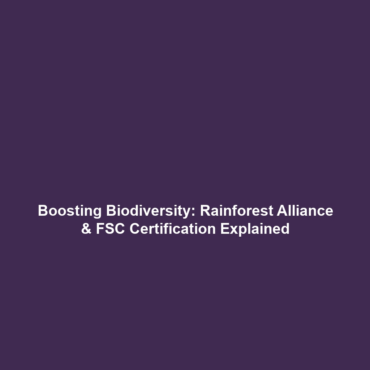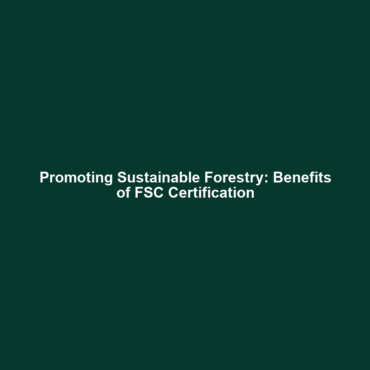Corporate and Market-Based Solutions: Private Sector Involvement in Deforestation Reduction
Deforestation and biodiversity loss pose significant threats to the planet’s ecosystems, and their mitigation requires concerted efforts across various sectors. Corporate and market-based solutions play a pivotal role in addressing these challenges through innovative strategies that engage private sector stakeholders. These solutions are essential for developing effective frameworks that not only protect forests but also promote sustainable practices. As we delve into the intricacies of private sector involvement in deforestation reduction, we will explore the major concepts, applications, and challenges involved.
Key Concepts
Corporate and market-based solutions involve strategies wherein the private sector collaborates with governmental and non-governmental entities to combat deforestation. These solutions encompass:
- Certification Schemes: Programs like the Forest Stewardship Council (FSC) and Rainforest Alliance promote responsible forest management through certification.
- Sustainable Supply Chains: Companies investing in sustainable sourcing practices help ensure that raw materials do not contribute to deforestation.
- Corporate Social Responsibility (CSR): Many businesses now prioritize environmental stewardship as a core value, impacting their operations and partnerships.
These principles highlight how corporate actions can lead to significant reductions in deforestation and enhanced biodiversity preservation.
Applications and Real-World Uses
How corporate and market-based solutions are used in deforestation reduction can be illustrated through several real-world applications:
- Sustainable Forestry Practices: Companies like IKEA are shifting towards sustainable wood sourcing, ensuring minimal environmental impact.
- Conservation Financing: Private investments in conservation projects, such as those by The Nature Conservancy, aid in protecting vital ecosystems.
- Technological Innovations: Leveraging technology, companies develop tracking systems to monitor supply chains and ensure sustainable practices.
These applications represent a growing trend where the private sector actively contributes to addressing deforestation and supporting biodiversity loss solutions.
Current Challenges
Despite the progress made in deploying corporate and market-based solutions, significant challenges persist, including:
- Lack of Transparency: Many companies struggle to provide clear and verifiable supply chain information.
- Greenwashing: Some corporations promote themselves as environmentally friendly without implementing substantial changes.
- Market Limitations: Financial incentives for sustainable practices may not align with immediate profits, deterring some businesses.
These challenges highlight the complexities involved in the application of corporate and market-based solutions in combating deforestation.
Future Research and Innovations
Looking forward, several innovations and research areas are emerging that show promise in enhancing private sector efforts in deforestation reduction:
- Blockchain Technology: This can provide transparent and secure tracking of products from source to shelf, ensuring sustainable practices.
- Remote Sensing: Advances in satellite technology may enable real-time monitoring of deforestation and land use changes.
- Data Analytics: Utilizing big data could lead to smarter decision-making regarding land use and conservation efforts.
Conclusion
Corporate and market-based solutions are essential in tackling the urgent issues of deforestation and biodiversity loss. By engaging the private sector, we can develop innovative strategies that not only protect natural resources but also encourage sustainable development. As we advance, it is crucial to prioritize transparency, accountability, and authentic commitment to environmental stewardship. For further insights into sustainable practices, explore our topics on sustainable forestry and biodiversity conservation.


